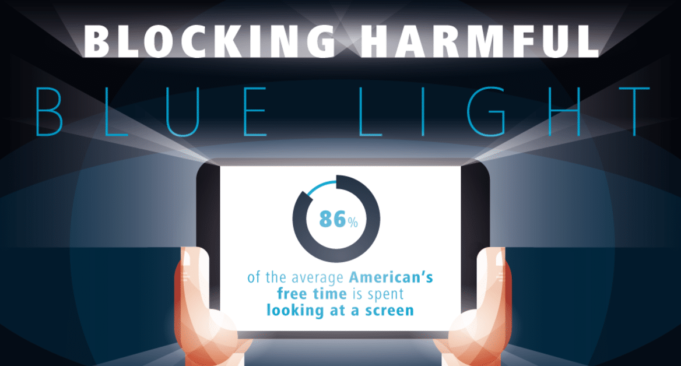Are you among the 86% of Americans whose free time is spent looking at digital screens? If the answer is yes, you need to know what you are doing to yourself. Digital screens are a detriment to your eye health for a number of different reasons.
For starters, when you stare at a computer screen or television all day oftentimes you will forget to blink, which can lead to a variety of problems relating to dry eye and fatigue. But what’s more serious than that is the blue light you are exposing yourself to whenever you are staring at a screen.
Blue light is everywhere. It the most abundant light in the visible light spectrum, and it’s also the shortest wavelength and it is also the highest energy wavelength. Blue light is emitted by the sun, by fluorescent and some LED light, and comes from every digital screen you may use, from computers to cell phones. High energy light like blue light and UV light can cause serious health problems. Eye problems include:
- Cataracts
- Macular Degeneration
- Pterygium
Forgetting to blink can be bad enough, but exposure to light waves on the sensitive tissues of the eyes can lead to serious long-lasting consequences. Cataracts have a surgical solution, but macular degeneration requires treatment that involves regular shots in your eyeball, which is obviously not pleasant.
Preventing these problems before they occur will save you a lot of hardship. Blue light exposure can cause a variety of health concerns, as well. Other eye problems which are related to blue light exposure include:
- Sleep disruptions
- Fatigue
- Blurred vision
- Headaches
- Eye strain
The main reason doctors are seeing more of these kinds of problems – severe cases of macular degeneration are up 25% – is because of the prevalence of screens and the increased time we are spending with them. In 2014 the average American adult was spending 7.4 hours a day looking at screens, while that figure was at nearly 11 hours a day just two years later in 2016.
Not only are we looking at screens when we are working, but we are also choosing screen time for recreation as well. Even kids are having a hard time looking away – the majority of parents report that their kids are spending far more than the recommended two hours a day looking at screens, even as infants.
There are a few things you can do to mitigate your exposure to and problems from blue light. For starters, do your best to minimize the amount of time you spend each day looking at digital screens. Leave yourself a note so you remember to blink. Utilize the 20-20-20 rule – every 20 minutes look away from your screen for 20 seconds to a distance of 20 feet.
This will help minimize fatigue and give your eyes a break. You can also add a blue light blocking coating to your glasses or wear special computer glasses if you are not a regular glasses wearer. Additionally, many electronic devices have blue light filtering settings that can save your eyesight from blue light exposure. Learn more about preventing health problems from blue light exposure from this infographic!













